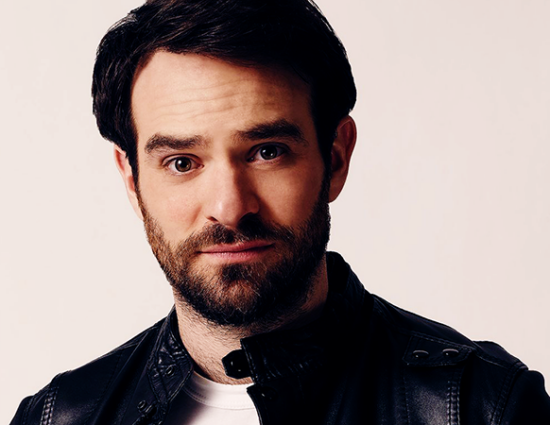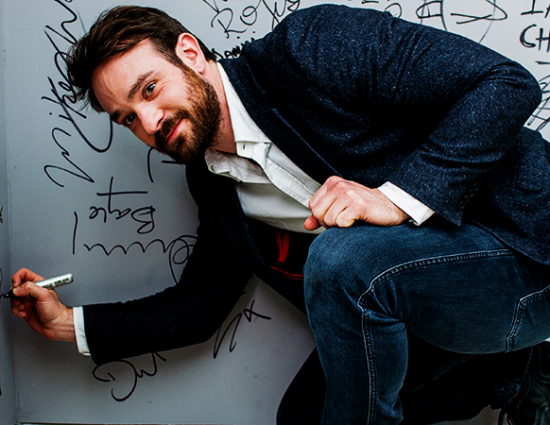Charlie is currently starring in a play at the Manhattan Theater Club production of Nick Payne’s INCOGNITO where he plays the part of Henry. Here Charlie talks to the New York Times about the part and the troubles of memory.
Charlie Cox Takes Off the ‘Daredevil’ Mask to Go ‘Incognito’
By BRUCE WEBERJUNE 15, 2016
A man looks up and sees his wife, expresses delight.
“Hello my love, where have you been?”
Such a sweet and ordinary query, yes? But context is all. As the most memorable line in “Incognito,” the cryptic new play about memory by the young British playwright Nick Payne, it is fraught with mystery and anguish. Repeated on a number of occasions by the same character with more or less the same inflection of wonder and happiness, it becomes a testament to the man’s profound amnesia, a condition that prevents him from remembering just about anything for more than a moment — aside from the face of his wife and his adoration of her.
The character, called Henry, is built on an amalgam of two famous patients in the history of neuropathology. For the audience, Henry’s plight, and that of his desperate and finally defeated wife, is baffling and heartbreaking. But for Charlie Cox, the 33-year-old English actor who plays him, it created a particular problem. How do you portray a man with so few evident qualities?
“What is Henry’s character if you take away the experience of his life thus far, and if you take away a feeling of knowing where he is and what he’s striving for?” Mr. Cox asked in a recent interview at City Center, where the Manhattan Theater Club production runs through July 10. “People who don’t suffer from memory loss, we’re always striving for something: Buy the dream house, pay the mortgage, something. Henry doesn’t live in a world where that’s possible because he can’t build up a catalog of memories.”
Mr. Cox, who is making his New York theater debut, is the son of a publisher of books about Parliament. He studied at the Bristol Old Vic and has performed at the Donmar Warehouse in London. He was introduced to American television audiences as Owen Sleater, a bodyguard and criminal enforcer in the HBO series “Boardwalk Empire.”
Indeed, as the mild-tempered and largely docile Henry, Mr. Cox is playing what many might consider against type. A spirited conversationalist, he has the bounce in his step of the soccer player he was in school and the athletic build you’d expect of a superhero; in his best-known role, he is, after all, the star of the Netflix series “Daredevil,” based on the Marvel comic book, in which he plays Matt Murdock, the blind lawyer whose alter ego is the title character, an extra-sensory-heightened battler against international evil.
Among the show’s distinctions are its strenuously gymnastic and violent fight scenes, some of which Mr. Cox performs — rather proudly — himself.
“There’s a fight sequence in Episode 7 of the second season, where I get thrown across the room onto a coffee table, which then collapses,” he said. “The first take Chris did” — Chris Brewster, his stunt double — “worked wonderfully well, so they said I could do the second one, and I did it and they used that one.”
Henry’s impaired brain aside, “Incognito” — which Ben Brantley of The New York Times called “a lively, self-examining drama of ideas” — is a considerably more cerebral challenge. Structured in tantalizingly brief scenes that skip back and forth in time over a number of decades, it uses minimal props and four actors (Mr. Cox, Geneva Carr, Heather Lind and Morgan Spector) who play a total of 21 roles to tell three stories.
One is about Henry; one is about Albert Einstein, his family, and the doctor who studied his brain; and one is about a clinical neuropsychologist, her love life and an amnesiac patient. All resonate with ruminations about the relationship between character and the brain. As the neuropsychologist (Ms. Carr) explains to her much younger lover (Ms. Lind):
“The brain builds a narrative to steady us from moment to moment, but it’s ultimately an illusion. There is no me, there is no you, and there is certainly no self; we are divided and discontinuous and constantly being duped. The brain is a storytelling machine and it’s really, really good at fooling us.”
In addition to Henry, Mr. Cox’s other roles include a conniving journalist, an unpleasantly macho lawyer and Hans Albert, Einstein’s son.
“If I’m totally honest with you, I have to say it seems more impressive than it is; it’s just muscle memory,” he said about the difficulty of playing multiple roles. What has been much more difficult, he said, was mastering Mr. Payne’s surprising writing, the leaps in logic — or illogic — that characterize his dialogue.
“When I’ve done plays in the past, you get to the first performance and you’ve identified three or four moments where you think, ‘That’s where I’ve really got to concentrate,’” he said. “In this play, there are countless moments like that.”
Obvious examples are the moments when Henry blanks out in midconversation and, in Mr. Cox’s word, “resets.”
To help him with the essentially incomprehensible nature of Henry’s inner logic, he consulted with a neuroscientist and studied — through books and videos — the real people who inspired the character: Henry Molaison, the amnesiac known in medical literature as H. M., who died in 2008 at 82; and Clive Wearing, a British musicologist and musician, now 78, who has had severe memory problems since 1985 because of encephalitis.
In Mr. Cox’s performance, the moments are characterized by a blankness of expression, perhaps a faint eyelid twitch and a hiccup of silence as if the needle on a record had been lifted quickly and moved back.
“What I didn’t want to do was always find a reason for him to look away,” he said. “Because that’s an easy way of doing it. We’re having a conversation, Henry looks over there, and when he looks back he doesn’t remember you. But that’s not what happens to Henry — the real Henry.
“And that interested me. Because what I didn’t understand is, if you’re talking to someone and suddenly you have no idea what conversation you’re in or who this person is, presumably that would be very frightening. If that happened to me right now, if we were talking and suddenly I had no idea who you were, I wouldn’t just continue the conversation. I’d be confused: ‘How did we get into the room?’ But in the play, it’s not written in a way where Henry freaks out, or even wonders what’s going on.”
Heather Lind, who plays Henry’s wife, said that the problem of having to make the same line fresh several times a night is simply an intensified version of the stage actor’s job, which is, performance to performance, “finding newness in repetition.”
“For Charlie, the challenge of playing Henry’s character is realizing, as Charlie, that he said the same line 10 seconds ago, but that as Henry he’s saying it for the first time,” she said. “For me, working on stage with him, I get to watch the mechanism at play. I get to watch him make the subtle switch. I can tell he’s consciously doing it, but then some freshness comes out of him each time.”
Perhaps, in the end, this was simply a part Mr. Cox was destined for. As he tells the story of his career, a crucial moment occurred at the end of the first of what was to be a three-year stint at Bristol Old Vic. He had been cast as a shepherd in a Nativity play, and over the summer break was instructed to learn to play the recorder.
He never did, however, and was rescued from embarrassment only by being cast at the last moment as Lorenzo in the 2004 film of “The Merchant of Venice,” which starred Al Pacino, a role that altered the arc of his professional life.
Why hadn’t he learned to play the recorder?
“I had forgotten,” he said.



